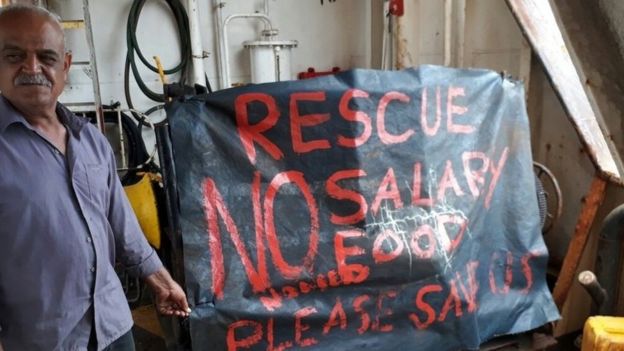You are here
Abandoned seafarers: Hungry, penniless and far from home
Abandoned seafarers: Hungry, penniless and far from home
Roz Tappenden 21 February 2020 https://www.bbc.com/news/uk-england-51008251
Seyed Nasr Soltan is one of the crew members stranded on board the PSD2. Photo: Sailors' Society
When a ship bound for east Africa was detained in Portland off the south coast of England in November, its Russian crew feared they would be stranded indefinitely.
They would have known of the fate that has befallen other seafarers in their situation - hundreds have been stuck on their vessels, some for years, when their ships' owners have run out of money. Sailors who leave their ships in these circumstances risk never being being paid and so feel they have to stay put.
With no income, dwindling supplies and no employer, those stuck in this predicament often rely on the kindness of strangers and the help of charities such as the Southampton-based organisation the Sailors' Society.
In 2017, 40 Indian seafarers aboard a flotilla of merchant ships who had been hired to transport crude oil from the UAE to Iraq were left stranded in waters just off Dubai because of a financial dispute involving the vessels' owner.
The shipping company failed to secure permission for them to enter port and before long life on board became unbearable. Desperate sailors began tweeting about the frightening conditions. They were hungry and in poor physical and mental health - and all the while, bailing out seawater from their leaking vessels.
The situation on board was "tense" with fighting, hunger, isolation and the intense heat all taking their toll.
"Every second on the clock felt like a year," said Rajesh Goli, a captain on one of the vessels. "We used to catch fish from morning to evening," he said of the 11 months he spent stranded within sight of Dubai. "There was no other option for us to survive."
He said it was very hot on board, more than 50 degrees Celsius, but they had no diesel to run the generator for the air conditioner. Sailors took to sleeping on deck because it was too hot inside.
"The ratings sometimes fought each other," Capt Goli said. "They were all very frustrated because they had to do their duty without getting salary or food. It was a very tense situation for me to make them understand."
Initially, the men were able to eat three meals a day but for the final seven months there was only enough food to eat once. They filtered rainwater through a cloth but the unpleasant smell made it difficult to drink.
"Everyone on board was sick - sometimes we only ate once every two days," Capt Goli said. "That affected our health a lot - everyone just dropped weight."
Unable to contact their families and with no clue of when they might be able to go home, many of the crew members suffered mental health problems.
To make matters worse, Capt Goli had taken out a loan to pay the agent who secured him the job. Not only was he unable to send money home to his wife and baby son in Mumbai, the loan interest was spiralling.
After an ordeal lasting almost a year, the sailors were eventually able to return to India, and Capt Goli now works in Mumbai as a chaplain for the Sailors' Society - a charity helping seafarers and their families all over the world.
Its chief operating officer Sandra Welch said ships were typically abandoned when the owners ran out of money to pay the crew or run the ship.
"In many cases, the ship itself is in poor condition, the owner can't - or won't - invest the money needed to repair it and the situation spirals out of control," she said.
"The crew are left powerless and penniless, often thousands of miles from home. Returning home can be practically impossible for seafarers stranded with no fuel, no money and sometimes no permission to access the nearest port."
She said that even if the owner or a charity offered to repatriate them, sailors often choose to stay until their wages are paid as they are afraid that if they leave the ship, they will lose any claims they have on their salaries.
Image copyright Sailors' Society
One such vessel is the offshore supply ship PSD2, which has been anchored off the east coast of South Africa since 2015.
Two men, including the captain, have not been paid for nearly five years but remain on board in the hope that one day they will be.
A third crew member was forced to leave the vessel when his wife died of cancer. He was repatriated to Bangladesh with the help of the Sailors' Society, although he it did not make it home in time for the funeral. The charity continues to supply essentials such as food, fishing equipment and medicine to the remaining two crew members.
According to International Labour Organization (ILO) figures, there are more than 160 active cases of vessel abandonment around the world, where crews are waiting to be paid and ships are stranded or detained. The abandoned seafarers database shows there are millions of dollars of wages left unpaid worldwide.

